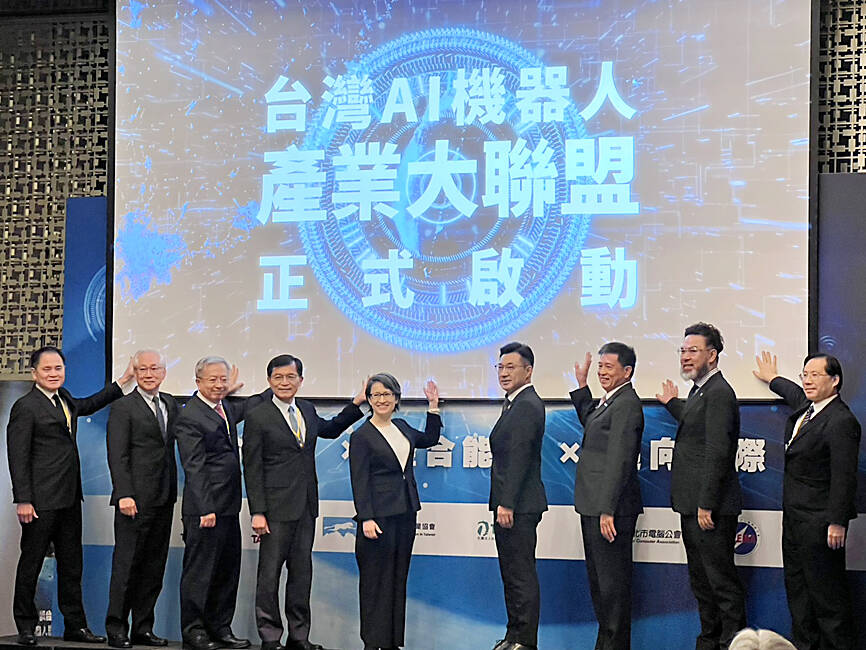Taiwan must invest in artificial intelligence (AI) and robotics to keep abreast of the next technological leap toward automation, Vice President Hsiao Bi-khim (蕭美琴) said at the luanch ceremony of Taiwan AI and Robots Alliance yesterday.
The world is on the cusp of a new industrial revolution centered on AI and robotics, which would likely lead to a thorough transformation of human society, she told an event marking the establishment of a national AI and robotics alliance in Taipei.
The arrival of the next industrial revolution could be a matter of years, she said.

Photo: Lin Jing-hua, Taipei Times
The pace of automation in the global economy can be gauged by Jeff Bezos’ announcement that robots now outnumber the human workforce of Amazon Technologies Inc, she added.
Robots would reduce the number of jobs in an economy, but also improve people’s quality of life and working conditions by taking over the most dangerous or difficult tasks, Hsiao said.
The government is investing in AI to encourage balanced economic development and maintain Taiwan’s technological edge, which has significant national security implications, she said.
The government’s initiatives to kick-start robotics had setbacks and is sure to have more of them in the coming years, as mistakes are the inevitable cost of making progress in any endeavor, she added.
“We must tolerate failure and find solutions when we fail for the nation to go forward,” Hsiao said.
The government’s role in the nation’s bid to develop AI and robotics is to create an appropriate regulatory environment, provide subsidies for introducing robots into various sectors, forge international partnerships, and integrate research-and-development efforts, she said.
The Taiwan AI and robotics alliance was set up by six industry groups, including the Taiwan Automation and Intelligence Robotics Association.
The alliance’s goal is to achieve more than NT$1 trillion (US$33.95 billion) in production output value by 2030, and has plans to develop autonomous vehicles, robot walkers, humanoid robots and “special application platforms,” the association said.
Taiwan specializes in the development of technological elements used in robotics production, such as controllers, sensors, chips and machinery, while also providing integrated system solutions, and developing AI computing capabilities and smart software, it said.
These strengths should help Taiwan set up an AI robotics ecosystem and develop AI robotics technologies up to international standards to help Taiwanese products become competitive in the global market, it added.
The ambitious plans would require Taiwanese industry to cooperate in forging self-sufficient supply chains for decisionmaking algorithms, drive controls, sensor suites and power plants, the association said.
The alliance would focus on introducing robotic products to eight major sectors — medicine, logistics, agriculture, manufacturing, long-term care, food, disaster relief and rovers — it added.
The other groups in the alliance are the Taiwan Machine Tool & Accessory Builders’ Association, the Taiwan Association of Machinery Industry, the Taiwan Electrical and Electronic Manufacturers’ Association, the Taipei Computer Association, and the Cloud Computing and IoT Association in Taiwan.

AGING: As of last month, people aged 65 or older accounted for 20.06 percent of the total population and the number of couples who got married fell by 18,685 from 2024 Taiwan has surpassed South Korea as the country least willing to have children, with an annual crude birthrate of 4.62 per 1,000 people, Ministry of the Interior data showed yesterday. The nation was previously ranked the second-lowest country in terms of total fertility rate, or the average number of children a woman has in her lifetime. However, South Korea’s fertility rate began to recover from 2023, with total fertility rate rising from 0.72 and estimated to reach 0.82 to 0.85 by last year, and the crude birthrate projected at 6.7 per 1,000 people. Japan’s crude birthrate was projected to fall below six,

US President Donald Trump in an interview with the New York Times published on Thursday said that “it’s up to” Chinese President Xi Jinping (習近平) what China does on Taiwan, but that he would be “very unhappy” with a change in the “status quo.” “He [Xi] considers it to be a part of China, and that’s up to him what he’s going to be doing, but I’ve expressed to him that I would be very unhappy if he did that, and I don’t think he’ll do that. I hope he doesn’t do that,” Trump said. Trump made the comments in the context

SELF-DEFENSE: Tokyo has accelerated its spending goal and its defense minister said the nation needs to discuss whether it should develop nuclear-powered submarines China is ramping up objections to what it sees as Japan’s desire to acquire nuclear weapons, despite Tokyo’s longstanding renunciation of such arms, deepening another fissure in the two neighbors’ increasingly tense ties. In what appears to be a concerted effort, China’s foreign and defense ministries issued statements on Thursday condemning alleged remilitarism efforts by Tokyo. The remarks came as two of the country’s top think tanks jointly issued a 29-page report framing actions by “right-wing forces” in Japan as posing a “serious threat” to world peace. While that report did not define “right-wing forces,” the Chinese Ministry of Foreign Affairs was

PREPAREDNESS: Given the difficulty of importing ammunition during wartime, the Ministry of National Defense said it would prioritize ‘coproduction’ partnerships A newly formed unit of the Marine Corps tasked with land-based security operations has recently replaced its aging, domestically produced rifles with more advanced, US-made M4A1 rifles, a source said yesterday. The unnamed source familiar with the matter said the First Security Battalion of the Marine Corps’ Air Defense and Base Guard Group has replaced its older T65K2 rifles, which have been in service since the late 1980s, with the newly received M4A1s. The source did not say exactly when the upgrade took place or how many M4A1s were issued to the battalion. The confirmation came after Chinese-language media reported